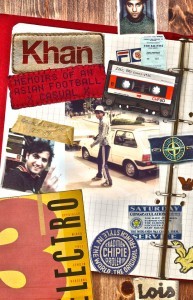Book Review: KHAN – Memoirs of an Asian Football Casual by Riaz Khan
 Quite simply, in its present form, this is a disconcerting book as it totally fails to achieve its purpose of reassuring the reader around the text’s central premise. Riaz Khan’s main aim is stated as intending to show that Muslims are not part of a ‘fifth column’ in Britain and that the English Defence League is wrong in that view. That may be the case, but the writer’s story does not prove the point for two main reasons. Firstly, becoming part of an anti-social group – namely Football Casuals – does not show Asians are integrating into British Society and, secondly, the author shows no remorse for the many acts of violence he committed. Reflecting on his experiences of thirty years ago, Riaz Khan still does not see what happened as wrong. This is problematic as we find out the author is now a teacher.
Quite simply, in its present form, this is a disconcerting book as it totally fails to achieve its purpose of reassuring the reader around the text’s central premise. Riaz Khan’s main aim is stated as intending to show that Muslims are not part of a ‘fifth column’ in Britain and that the English Defence League is wrong in that view. That may be the case, but the writer’s story does not prove the point for two main reasons. Firstly, becoming part of an anti-social group – namely Football Casuals – does not show Asians are integrating into British Society and, secondly, the author shows no remorse for the many acts of violence he committed. Reflecting on his experiences of thirty years ago, Riaz Khan still does not see what happened as wrong. This is problematic as we find out the author is now a teacher.
As such the book has little whatsoever to do with the game of football and the reader will search long and hard for any actual match detail, any warmth and emotional attachment to a team, or any identification with players. ‘Kick off’ always refers to fighting not football matches. At its simplest level it is a well-written account about football hooliganism and how it was a pathway for some Asians to become assimilated in some way to at least a subculture of British society. The self-styled Football Casuals were prominent back in the 1980s and this lends an air of nostalgia to a book written on a topic that was unfortunately and inextricably linked to the English game at the time. An instance of the author’s desire to play down just how unpleasant and frightening the Casuals were to the rest of society is when one of them is described as “one of the nicest hooligans you could meet.”
It is hard, if not impossible, to persuade the ordinary person that by becoming part of a subculture totally dedicated to physical violence, the author, his brother and other ethnics in Leicester managed to dispel racial/religious hatred, breaking down “many barriers”, except in the literal sense. A sample of the attitude comes from the chapter narrated by a member of the Wongs gang: “The football was a buzz for those few months, but when we started getting arrested for it we sat back and thought, for football? No. If you were going to get arrested it was for your mates, not for a football match. When it came to football, it was really about ‘our territory’. Another team couldn’t come to our town and shit on us, that’s why we gathered together to fight back. We just went to the football for a fight; not for the fashion or the team.”
Such narrative additions, honest and forthright though they are, weaken the narrative flow and the story is at its best when giving a personal account, especially as it depicts a person from a Pashtun/Afghan background caught in a cultural conflict and with no sense of belonging. Riaz Khan writes wittily and affectionately about his parents and the gulf that exists between them, they first-generation immigrants, he British-born and desperately seeking an identity.
That he finds one through clothing and music is understandable. Less so that he truly feels a sense of belonging through soccer violence and it is worrying that he at no time expresses any true regret for the damage he inflicted on many people nor even explores such a possibility. “It was a unique era, a golden age, undoubtedly the best years of my life,” says the author and yet he served two custodial sentences, one for slashing a man’s face with a ‘blade’.
The noble intentions expressed in the Forward (sic) and Preface are frustrated because there is no shame attached to what happened and to the damage inflicted on both the individuals involved and, more importantly, wider society.
Although the book is available for purchase electronically, it is still in a draft form, needing further editing, particularly in the areas discussed above. An editor’s contribution is sadly lacking, both in terms of balancing viewpoints and in producing a thoroughly professional text. The Foreword, for example, is misspelt and it is not normal practice to thank yourself for kind permission to use your own photographs. Riaz Khan is a capable writer and it is to be hoped he can reflect deeply about what he has so far produced and focus on where it needs amending so that it can make a worthy contribution to the debate. But, to do so, he needs to see the Casual era as more than just a personal rite of passage.
Graeme Garvey